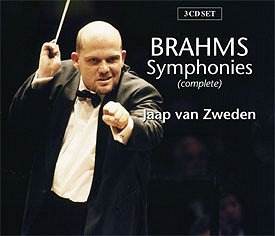Any new set of Brahms Symphonies has to compete with
the best and this is a very tall order. Even at super-budget price,
it almost impossible not to be mindful of established rival versions
when reviewing the merits of this release from Jaap van Zweden on Brilliant
Classics.
Jaap van Zweden, 42 years old, is a former concertmaster
of the Concertgebouw Orchestra, and must be steeped in the romantic
symphonic repertoire. He took up conducting in 1995 and is currently
music director of the Residentie Orchestra in The Hague . On this set
he directs them in the Symphonies 1, 3 and 4 whereas the Symphony No.
2 is performed with the Radio Philharmonic Orchestra of Holland.
The first, third and fourth symphonies, recorded in
Amsterdam last summer, favour the woodwind section; the strings are
detailed yet sound oddly veiled. The 1999 Hilversum recording of the
Second Symphony has a better orchestral balance but it suffers from
a languid and inert first movement. Clocking in at twenty-one minutes,
several times it nearly grinds to a halt. By contrast the syncopated
sections of the Allegretto are so light they could come from a Tchaikovsky
ballet.
Van Zweden too often takes a leisurely, pastoral view
of Brahms. Most big movements tend to sag in the middle. What he does
bring out – partly due to the recording – is the wealth of great writing
for the woodwind, and how important this is to the cycle. I sense that
he is most probably a fine Bruckner conductor.
The dotted rhythms of the finale of the Third
Symphony are skilfully negotiated by the Dutch players, yet a fairly
good interpretation is let down by a disappointing third movement. Its
glorious autumnal colours sound weary and the trio section is four-square.
The approach is almost too respectful.
Also in the monumental Fourth, phrasing is blurred
at the edges and regularly wanders. Paradoxically, this brings with
it a spontaneous feel to the set and convinced me of the honesty of
the van Zweden’s interpretations.
Most impressive of all is the First Symphony, which
I played last. The tragic expressiveness of the opening movement is
fully sustained and the tempi are just right. The van Zweden’s reading
of the first has an urgency missing elsewhere on the set. The rich string
sound in the Andante provides a rapturous interlude.
The filler on Disc 2, rather than the usual overtures,
is an orchestration by Henk de Vlieger of Brahms’ "Eleven Chorale Preludes",
Op.122, his last composition. Originally for organ, its inclusion here
is a fascinating oddity. There are some surprisingly delicate orchestral
textures contrasted with the sinewy lyricism typical of Hindemith. A
most rewarding bonus.
Not surprisingly the competition is fierce and numerous
between alternative versions of the complete Brahms symphonies. Despite
the merits this set from Jaap van Zweden on Brilliant Classics is not
really in the same league as numerous other more recommendable sets.
Many good judges feel that the clear first choice is
the modern digital set from Claudio Abbado with the Berlin Philharmonic
Orchestra on DG 435 683-2 (4). The analogue set from the late Herbert
von Karajan again with the Berlin Philharmonic Orchestra on DG 453 097-2
(2) has also been a popular top recommendation for some time.
Ever since its original release in the early 1980s
my own particular favourite set of the Brahms symphonies has been the
early digital recordings by the late Günter Wand with the North
German Radio Symphony Orchestra on RCA 74321 20283-2 (2).
At super-budget price this release from Brilliant Classics
is certainly worth a listen. A "live"-sounding set, honestly presented.
Michael Cookson

